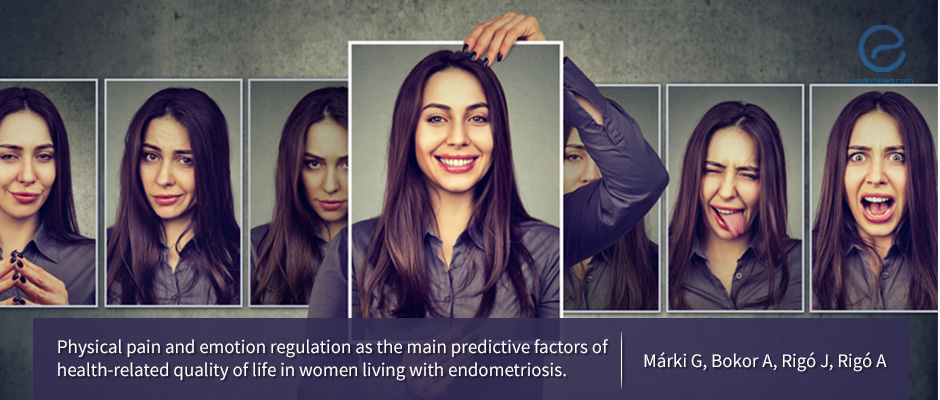Pain and emotion regulation predict health-related quality of life
Sep 7, 2018
Health-related quality of life (HRQoL) in patients living with endometriosis can be improved in different ways, including the management of pain and emotion regulation.
Key Points
Importance
- This is the first study to explore the association between endometriosis-related pain symptoms, emotion regulation difficulties, psychological stress (anxiety, depression, and distress), and HRQL in patients with endometriosis.
Key Results
- Increased physical pain and difficulties in emotion regulation both led to increased psychological stress, which is associated with deterioration of HRQL.
What’s Done Here
- 193 women, with a confirmed medical diagnosis of endometriosis, participated in the study, and the results were evaluated by statistical methods.
- Pain symptoms were measured on a Likert scale, and the Short Form Health Survey was used to measure both physical and mental HRQL.
- The mood was determined through the Hospital Anxiety and Depression Scale, the Perceived Stress Scale was administered to determine the distress level.
- The Difficulties in Emotion Regulation Scale was used to measure emotion regulation, including factors such as non-acceptance of emotional responses, difficulties engaging in the goal-directed behavior, impulse control difficulties, lack of emotional awareness, limited access to emotion regulation strategies, and the lack of emotional clarity.
Limitations of the Study
- The cross-sectional study design, self-selected and self-reported nature and the Hungarian-only data limit the generalizability of the findings.
- The authors suggest a longitudinal design, increasing the number of participating gynecological clinics, controlling the severity and type of endometriosis, and excluding patients having comorbid diseases.
Lay Summary
Studies have established that pain in endometriosis is negatively correlated with HRQL and that endometriosis is associated with psychological problems, anxiety, depression, distress and poor coping ability. It has been observed that some mental conditions associated with endometriosis are modulated by emotion regulation, defined as “goal-directed processes functioning to influence how we experience and express the intensity, type, and duration of emotion”.
Researchers from Budapest, Hungary conducted this study to analyze whether emotion regulation and psychological stress (anxiety, depression, and distress) can have a notable effect on HRQL, besides pain symptoms.
The first model observed the impact on overall HRQL and showed that psychological stress largely mediated the relationship between higher pain and lower HRQL. On the other hand, psychological stress fully mediated the effect of emotion regulation difficulties on HRQL. The second and the third model observed the impact on physical and mental HRQL, respectively. Physical HRQL was strongly explained by the high negative effect of physical pain and was moderately explained by emotion regulation difficulties. On the other hand, mental HRQL could not directly be explained by physical pain.
Based on the findings, the authors advise that the “main goal of treatment should be to reduce pain symptoms in order to improve HRQL”. However, as the results revealed that in addition to increased physical pain, difficulties in emotion regulation lead to increased psychological stress, causing lower QoL, authors suggest that “the improvement of emotion regulation skills should be a treatment goal as well”.
The authors go on to mention that there is no published thematic health promotion program for women living with endometriosis, despite evidence showing a strong need for it and recommend the development of such a program. They also state that “further research is needed to clarify the relationship between pain and emotion regulation, and to investigate the role of psychological stress and emotion regulation difficulties in the (re)emergence of endometriosis.”
Research Source: https://www.ncbi.nlm.nih.gov/pubmed/28482063
endometriosis health-related quality of life pain psychological stress emotion regulation

